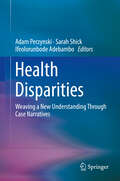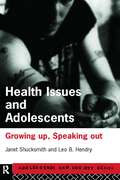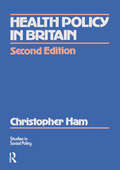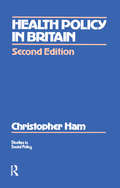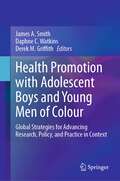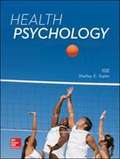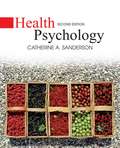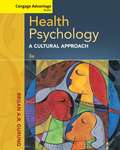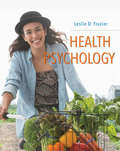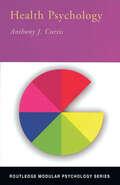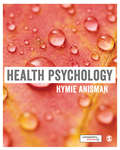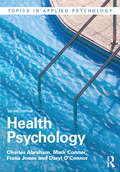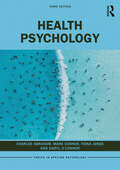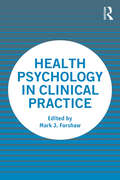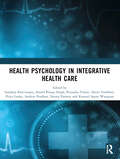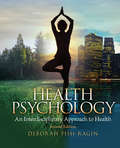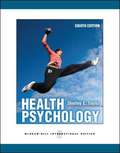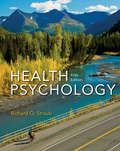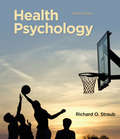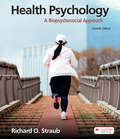- Table View
- List View
Health Disparities: Weaving a New Understanding Through Case Narratives
by Adam Perzynski Sarah Shick Ifeolorunbode AdebamboThis uniquely accessible volume challenges professionals to understand—and help correct—health disparities, both at the patient level and in their larger social contexts. Dedicated to eradicating this ongoing injustice, contributors focus on marginalized populations, the role of healthcare systems in perpetuating inequities, the need for deeper engagement and listening by professionals, and the need for advocacy within professional education and the political/policy arena. The compelling case narratives at the core of the book illustrate the interrelated biopsychosocial components of patients’ health problems and the gradations of learning needed for practitioners to address them effectively. The book’s tools for developing a health disparities curriculum include a selection of workshop exercises, facilitator resources, and a brief guide to writing effective case narratives. A sampling of the narratives: “Finding the Person in Patient-Centered Health Care” (race/ethnicity/culture). “The Annual Big Girl / Big Boy Exchange” (gender). “Just Give Me Narcan and Let Me Go” (poverty/addiction). “Everyone Called Him Crazy” (immigration). “Adrift in the System” (disability). “Aging out of Pediatrics” (mental illness and stigma). “Time to Leave” (LGBT) A work of profound compassion, Health Disparities will be of considerable interest to researchers and practitioners interested in public health, population health, health disparities, and related fields such as sociology, social work, and narrative medicine. Its wealth of educational features also makes it a quality training text. "I was impressed when I read Health Disparities: Weaving a New Understanding through Case Narratives. As a patient who has experienced unpleasant situations in health care, I was moved to see that it was emotional and personal for the writers. The book confirms for me that the time is now for change to take place in our health care systems. I see this book as a light that can shine bright in the darkest places of health care. The editors have assembled a powerful book that provides all health professionals with specific steps they can take towards addressing and then eventually eliminating health disparities. A few steps that I really connected with were improving critical awareness, delivering quality care, listening and empathizing with patients and families, and advocating for changes. I recommend that anyone interested in working to improve health care obtain a copy of this book—it’s filled with useful information that every medical professional should know. The book reminds me of a quote by Wayne Dyer, 'When you change the way you look at things, the things you look at change.'" -Delores Collins, Founder and Executive Director, A Vision of Change Incorporated, Certified Community Health Worker. Founder of The Greater Cleveland Community Health Workers Association.
Health Issues and Adolescents: Growing Up, Speaking Out (Adolescence And Society Ser.)
by Leo Hendry Janet ShucksmithYoung people do not on the whole speak for themselves: they are spoken for by adults. Most research and policy agendas relating to young people are dominated by adult concerns about young people's health - rarely are the issues looked at from young people's perspective. This gap in our knowledge may be a critical factor in explaining some of the problems that health educators face in getting young people to transform health knowledge into action. Based on their own research, Shucksmith and Hendry relocate the issues to a young person's perspective and provide recommendations about initiatives relevant to a wide range of professionals and researchers involved in the health education of young people.
Health Law and Medical Ethics in Singapore
by Gary Chan Kok YewThis book encompasses two inter-related disciplines of health law and medical ethics applicable to Singapore. Apart from Singapore legal materials, it draws upon relevant case precedents and statutory developments from other common law countries and incorporates recommendations and reports by health-related bodies, agencies and committees. The book is written in an accessible manner suitable for tertiary students. It should also serve as a useful resource for medico-legal practitioners, academics and healthcare professionals who wish to keep abreast of the evolving legal and ethical developments concerning health and medicine.
Health Policy in Britain: The Politics and Organization of the National Health Service
by Christopher HamCovers Britain's National Health Service: its policy and structure. 'Christopher Ham's book provides an historical and theoretical introduction to the making, implementation and evaluation of health policy in Britain. It has been completely revised throughout for this third edition with new chapters added on the current health service reforms and key issues for the future of health policy setting the British situation in an international context. 'It is hard to find a better basic textbook about health policy in Britain for students with little existing knowledge. However, it can also be highly recommended for readers who work in the NHS, but want to make more sense of the often confusing web of policies and imperatives. This book manages to synthesise a mass of material in a readable form, and enlightens as well as informs.' Public Health.
Health Policy in Britain: The Politics and Organization of the National Health Service (Studies In Social Policy)
by Christopher Ham'Christopher Ham's book provides an historical and theoretical introduction to the making, implementation and evaluation of health policy in Britain. It has been completely revised throughout for this third edition with new chapters added on the current health service reforms and key issues for the future of health policy setting the British situation in an international context. 'It is hard to find a better basic textbook about health policy in Britain for students with little existing knowledge. However, it can also be highly recommended for readers who work in the NHS, but want to make more sense of the often confusing web of policies and imperatives. This book manages to synthesise a mass of material in a readable form, and enlightens as well as informs.' Public Health.
Health Promotion with Adolescent Boys and Young Men of Colour: Global Strategies for Advancing Research, Policy, and Practice in Context
by James A. Smith Derek M. Griffith Daphne C. WatkinsThis book highlights novel and pragmatic health promotion efforts being adopted with boys and young men of colour (BYMOC) globally that apply a strengths-based approach. Men's adoption of risky health practices and reluctance to seek help and engage in preventive health behaviours have frequently been used to explain their poorer health outcomes, particularly among adolescent boys and young men, and disproportionately affecting BYMOC. Emerging literature on equity and men's health has conveyed that intersections among age, race, sexuality, socioeconomic status and geography contribute to a complex array of health and social inequities. There is growing evidence to suggest these inequities shape the health practices of BYMOC. Unfortunately, these health and social inequities can have negative lifelong consequences. An increased focus on reducing health inequities has led to a greater focus on health promotion actions that address social and cultural determinants of health.The vulnerabilities that BYMOC face are diverse and are reflected in a range of tailored health promotion interventions. Health promotion approaches that influence structural and systemic inequities experienced by BYMOC have been a prominent feature. In this volume, the editors and contributors purposefully bring together international research and promising practice examples from Australia, the United States, New Zealand, and Canada to celebrate health promotion strategies that help to improve the health and social trajectories of BYMOC. In doing so, the book moves beyond discussing the health inequities faced by this population, to talk about the practical actions to address them in context. Health Promotion with Adolescent Boys and Young Men of Colour brings together diffuse strands of scholarship relating to male health promotion, gender/masculinities and health, equity and men's health, and gender and youth development. The book is a unique and useful resource for practitioners, policy-makers, researchers and students with an interest in health promotion/public health, social work/social policy, education, men's health, youth development, Indigenous studies, and health and social equity.
Health Psychology
by Michael Murray David F. Marks Brian Evans Emee Vida EstacioThis book provides an introduction to key theoretical and methodological issues in developing a critical health psychology. It considers alternatives to the positivist assumptions underlying traditional health psychology, and proposes a reconstructed discipline that on the one hand delves into the experience of health and illness, and on the other engages with the social and political aspects of the subject. Containing carefully edited contributions from key thinkers in the field, it provides a coherent critique of mainstream health psychology.
Health Psychology
by Shelley TaylorSince the first edition was published in 1986, Health Psychology has helped thousands of college students learn how to maintain their health and guard against illness. The goal of this book has always been to make research accessible in a way that integrates theory with practical applications so that people can lead healthier lives. The importance of social relationships, health behaviors, and co-management of health and illness are themes that are woven throughout the text. The Connect course for this offering includes SmartBook, an adaptive reading and study experience which guides students to master, recall, and apply key concepts while providing automatically-graded assessments.
Health Psychology (2nd Edition)
by Catherine A. SandersonThe 2nd Edition of Catherine Sanderson's Health Psychology targets the mainstream health psychology market and offers a broad appeal through its narrative that is both challenging for psychology majors and accessible to non-majors. This book provides current and relevant information while providing a foundation in scientific research and critical and analytical thinking. The book emphasizes practical and real-world issues. Additionally, this text includes a focus on current ethical issues in health; expanded coverage of international health; increased emphasis on critical thinking and analysis; coverage of specific topics such as complementary and alternative medicine, accidents as a cause of death, and the role of ethnicity and gender in influencing health behavior; an emphasis on practical information; and updated coverage of all material which is particularly important in the field of health psychology given the dramatic advances in knowledge about the factors that influence physical well-being during the last five years.
Health Psychology (A Cultural Approach)
by Regan A. R. GurungUsing a conversational style that conveys the excitement, research base, and real-world applications of the field, Regan A. R. Gurung introduces health psychology with an integrated cultural perspective. Gurung focuses on key determinants of behavior--such as family, ethnicity, and religion--which are not always highlighted in health psychology books. The text is packed with the most up-to-date citations available, presenting topics taken straight from headline news as well as classic issues in the field. A range of vivid examples from different cultural groups provides you with a comprehensive description of basic theories and an overview of cutting-edge research in health psychology. Special sections that highlight clinical applications, coverage of personality and social psychological theories, and chapters devoted to variations in cultural beliefs, human development, and different diseases combine to give you the best of many worlds.
Health Psychology (First Edition)
by Leslie D. FrazierHealth Psychology provides a science and empirically-based approach to health psychology. It goes beyond other mainstream textbooks by introducing students to global and cross-cultural health issues, covering cutting-edge scientific and medical topics in ways that students can understand. The author integrates core theory, research, and practice in an engaging and practical way. The author integrates the biopsychosocial perspective, building on traditional content and topics in order to aid student understanding, interest, and learning. This textbook incorporates engaging applications, case studies and frequent examples, clear and thorough explanations, and a student-friendly tone. It insists on the implications of positive and negative health behaviors for a student's life. The author also provides an emphasis on developmental influences on health. Within each chapter, thought-provoking issues drawn from the World Health Organization and other international health organizations highlight our current understanding of health and wellness. Chapters open with personal profiles, ending with how the chapter addresses the questions that these raise.
Health Psychology (Routledge Modular Psychology)
by Anthony CurtisThis simple and concise introduction to the psychology of health is the perfect text for students new to the area. Topics covered include health policy and epidemiology, genetic factors in disease, the experience of illness as a patient, beliefs and attitudes, stress, pain and healthy lifestyles.
Health Psychology (SAGE Foundations of Psychology series)
by Professor Hymie AnismanHormones in your gut can affect the way you behave, prenatal infections have been associated with the development of schizophrenia and women doing shift work are more likely to develop diabetes. This book looks at fieldwork and health promotion through a psycho-social and biological perspective, to limit the occurrence of illness. We might not always be successful in preventing or overcoming every pathological condition through psychological and life-style changes, but at the least, stress can be diminished and quality of life can be enhanced. The author presents both key and up-to-date studies to help the reader explore the varied ways in which the biological, physiological and social factors at an individual and systematic level all affect psychology and how effective interventions can influence the health of a population. Mapped to course requirements and exploring bio-social, developmental and life-style factors in relation to physical and psychological disturbances, Health Psychology is an indispensable companion for undergraduate and postgraduate students in psychology, health sciences, nursing and education students. Supported by a wealth of learning features and additional content, this book will give your students: Access to the SAGE companion website which includes interactive quizzes, author selected videos, further reading, glossaries, testbanks and powerpoint slides 17 chapters packed with case studies, the latest research and areas of study The knowledge and skills to link theory to practice
Health Psychology (SAGE Foundations of Psychology series)
by Professor Hymie AnismanInstructors - Electronic inspection copies are available or contact your local sales representative for an inspection copy of the print version. Hormones in your gut can affect the way you behave, prenatal infections have been associated with the development of schizophrenia and women doing shift work are more likely to develop diabetes. This book looks at fieldwork and health promotion through a psycho-social and biological perspective, to limit the occurrence of illness. We might not always be successful in preventing or overcoming every pathological condition through psychological and life-style changes, but at the least, stress can be diminished and quality of life can be enhanced. The author presents both key and up-to-date studies to help the reader explore the varied ways in which the biological, physiological and social factors at an individual and systematic level all affect psychology and how effective interventions can influence the health of a population. Mapped to course requirements and exploring bio-social, developmental and life-style factors in relation to physical and psychological disturbances, Health Psychology is an indispensable companion for undergraduate and postgraduate students in psychology, health sciences, nursing and education students. Supported by a wealth of learning features and additional content, this book will give your students: Access to the SAGE companion website which includes interactive quizzes, author selected videos, further reading, glossaries, testbanks and powerpoint slides 17 chapters packed with case studies, the latest research and areas of study The knowledge and skills to link theory to practice
Health Psychology (Topics in Applied Psychology)
by Charles Abraham Mark Conner Fiona Jones Daryl O'ConnorThe new edition of Health Psychology is the perfect introduction to this rapidly developing field. Throughout the book, the psychological processes that shape health-related behaviours, and affect core functions such as the immune and cardiovascular systems, are clearly explained. These relationships provide the foundation for psychological interventions which can change cognition, perception and behaviour, thereby improving health. The book is split into five sections, and builds to provide a comprehensive overview of the field: the biological basis of health and illness stress and health coping resources: social support and individual differences motivation and behaviour relating to patients Extensively revised to include new material on behavioural change, the role of stress, resilience and social support, recovery from work, and the care of people with chronic disease, the book also includes a range of features which highlight key issues, and engage readers in applying what we have learned from research. This is essential reading for any undergraduates studying this exciting field for the first time, and the perfect primer for those embarking on postgraduate study.
Health Psychology (Topics in Applied Psychology)
by Charles Abraham Mark Conner Fiona Jones Daryl O'ConnorNow in its third edition, Health Psychology offers the perfect introduction to this rapidly developing field. Clearly explaining the psychological processes that shape health-related behaviors, and affect core functions such as the immune and cardiovascular systems, it shows how these relationships provide the foundation for psychological interventions which can change cognition, perception and behavior, thereby improving health.Divided into five parts, the book looks at the biological bases of health and illness, stress and health, coping resources, motivation and behaviour, and applied health psychology. The third edition has been revised to highlight:• Current research on the biological processes that underpin stress and illness.• How stress can be best managed at individual, organisational and community levels.• The ways people’s beliefs and attitudes shape motivation and behaviour.• How health promotion can effectively change beliefs and attitudes to promote health behavior change.• The implications of current health psychology research for services.• How health psychology research can improve healthcare practice.• Looking at the roles of practitioner health psychologists.The book is supported by useful in-text features including boxes that highlight key issues, activity boxes and essay questions to engage readers in applying what they have learned from research, and suggestions for further reading to encourage further study.With its clear structure and ability to eloquently link theory to real-world application, this is the perfect primer for both undergraduates studying health psychology for the first time, and those embarking on postgraduate study in this exciting field.
Health Psychology in Action
by David Sheffield Mark ForshawA definitive guide to the growing field of health psychology, which showcases contributions from academics and professionals working at the cutting edge of their discipline.Explores the field of modern health psychology, its latest developments, and how it fits into the contexts of modern healthcare, industry and academiaOffers practical, real-world examples and applications for psychological theory in health care settingsProvides a timely resource to support the new HPC registration of health and other psychologistsIncludes contributions from practitioners in a wide range of health care settings who share their own vivid personal experiences, as well as more general guidance to applying theory in practice
Health Psychology in Australia
by Melissa Day Jillian Dorrian Einar Thorsteinsson Di Benedetto Mirella Lane-Krebs Katrina Amanda Hutchinson Kerry ShermanIn today's diverse society, health professionals require a complete understanding of how physiological, social and psychological factors impact physical wellbeing. Health Psychology in Australia provides a contemporary, relevant perspective on the unique climate in which this increasingly important area of healthcare is practised in Australia. Drawing on the expertise of the author team, this book gives students the skills to identify and evaluate health risk factors and to intervene in and manage health behaviour. Each chapter includes learning objectives, case studies with accompanying reflection questions, critical thinking activities and a detailed summary to consolidate learning. The comprehensive glossary and links to online resources solidify understanding of key concepts and ideas. Written with a focus on respectful advocacy of health promotion, Health Psychology in Australia provides psychology and allied health students with a comprehensive understanding of the role of the health psychologist as clinician, researcher, educator and client.
Health Psychology in Clinical Practice
by Mark J. ForshawHealth Psychology in Clinical Practice provides a collection of first-hand accounts from several of the most established and experienced clinically working Health Psychologists in the UK, explaining what they do, how they do it and why their work is important. In recent years, health psychologists have come into their own in being able to provide high-quality, evidence-based, clinical support for patients by utilising relevant therapies. Trainees and would-be clinical practitioners in the health psychology community are keen to learn more about this aspect of their craft, and this book provides a valuable source of information they can turn to – unlike the vast majority of literature on clinical practice in psychology, written by clinical psychologists, which is mostly of tangential relevance to a health psychologist. As a compilation, the first-hand accounts within Health Psychology in Clinical Practice provide a guide that will help define what clinical health psychology is and should be for a decade or more. This book is an essential resource as a crucial snapshot of practice in the discipline in the UK and will additionally support trainees and those seeking a career in health psychology centered on practice rather than research or teaching.
Health Psychology in Integrative Health Care
by Sundeep Katevarapu Anand Pratap Singh Priyanka Tiwari Akriti Varshney Priya Lanka Aankur Pradhan Neeraj Panwar Kumud Sapru WangnueThe 8th International Conference of Indian Academy of Health Psychology (ICIAHP 2023) gathered leading experts, researchers, and professionals to exchange insights and explore innovations in mental and physical well-being. Featuring workshops on trauma release, hypnotherapy basics, mindfulness-based CBT, and suicide prevention, ICIAHP offered a diverse learning experience. Distinguished speakers from national and international universities attended the conference. The conference catered to health psychology professionals, researchers, educators, and scholars. ICIAHP 2023 stood out for its comprehensive program, renowned speakers, and ample networking, providing a platform for holistic learning and collaboration.
Health Psychology, 2nd Edition: An Interdisciplinary Approach to Health
by Deborah Fish RaginA truly interdisciplinary approach to the study of health, Health Psychology: An Interdisciplinary Approach uses the social ecological perspective to explore the impact of five systems on individual health outcomes: individual, culture/family, social/physical environment, health systems and health policy. In order to provide readers with an understanding of how health affects the individual on a mental and emotional level, the author has taken an interdisciplinary approach, considering the roles of anthropology, biology, economics, environmental studies, medicine, public health, and sociology.
Health Psychology, Eighth Edition
by Shelley E. TaylorThe book highlights health issues that face the college student and his or her family through both accessible research examples and profiles of interventions such as coping with stress, maintaining physical health, and making decisions about alcohol and smoking. This edition contains clear descriptions of current research into the prevention, treatment, and causes (social, genetic, and biological) of specific health related disorders.
Health Psychology, Fifth Edition
by Richard O. StraubStraub’s Health Psychology shows students how psychology and health are interconnected. The text encourages students to make meaningful connections between the science of health psychology and their own everyday experience. The text is comprehensive in its approach, includes in engaging real world examples, and thoroughly examines the intersection of diversity and health with regard to gender, ethnicity, age, and orientation. Health Psychology incorporates the latest research and uses the biopsychosocial perspective as it explores the main ideas of the field and models a scientific way of thinking about those ideas.
Health Psychology: A Biopsychosocial Approach
by Richard O. StraubRichard Straub’s Health Psychology shows students how psychology and health are interconnected. Using real world examples, Straub encourages students to make meaningful connections between the science of health psychology and their own everyday experience. Health Psychology is comprehensive in its approach and incorporates the latest research as it examines the field’s main ideas and models a scientific way of thinking about those ideas.
Health Psychology: A Biopsychosocial Approach
by Richard O. StraubStraub’s Health Psychology helps you make meaningful connections between the science of health psychology and everyday experiences such as stress, coping, and sleep.
